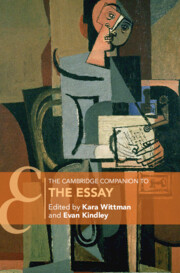Book contents
- The Cambridge Companion to the Essay
- The Cambridge Companion to the Essay
- Copyright page
- Contents
- Figures
- Contributors
- Acknowledgments
- Chronology: 440 Years of Essays
- Introduction
- Part I Forms of the Essay
- Part II The Work of the Essay
- 6 Experimental Science and the Essay
- 7 Essay, Enlightenment, Revolution
- 8 The Essay, Abolition, and Racial Blackness
- 9 The Utopian Essay
- 10 Ethics and the Essay
- 11 Essay and Empire
- 12 Unqueering the Essay
- Part III Technologies of the Essay
- Further Reading
- Index
- Cambridge Companions To …?
9 - The Utopian Essay
from Part II - The Work of the Essay
Published online by Cambridge University Press: 27 October 2022
- The Cambridge Companion to the Essay
- The Cambridge Companion to the Essay
- Copyright page
- Contents
- Figures
- Contributors
- Acknowledgments
- Chronology: 440 Years of Essays
- Introduction
- Part I Forms of the Essay
- Part II The Work of the Essay
- 6 Experimental Science and the Essay
- 7 Essay, Enlightenment, Revolution
- 8 The Essay, Abolition, and Racial Blackness
- 9 The Utopian Essay
- 10 Ethics and the Essay
- 11 Essay and Empire
- 12 Unqueering the Essay
- Part III Technologies of the Essay
- Further Reading
- Index
- Cambridge Companions To …?
Summary
This chapter argues that the European utopian tradition was significantly transformed by Latin American essayists in the early twentieth century. The author focuses on the Mexican writer Alfonso Reyes, whose works were crucial in defining the notion of “the New World” as a postcolonial space, as well as on José Vasconcelos’s widely read utopian essay La raza cósmica (1925).
Keywords
- Type
- Chapter
- Information
- The Cambridge Companion to The Essay , pp. 141 - 153Publisher: Cambridge University PressPrint publication year: 2022

